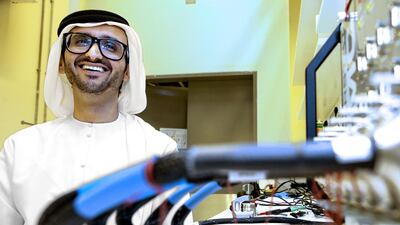Saif Al Mheiri is an assistant professor in the department of mechanical and materials engineering at Masdar Institute of Science and Technology in Abu Dhabi. After completing his bachelor’s in mechanical engineering at the University of Arizona in 2004, Mr Almheiri did his masters and PhD at the University of Miami. Dr Al Mheiri, who is Emirati, joined Masdar in 2012. His research interests are alternative energy sources such as fuel cells, as well as large-scale energy storage devices and hybrid alternative energy systems.
5.30am
I wake up when my wife wakes me up. I like to have breakfast like a king, because it’s probably the only meal I’ll eat that day. I look for high-protein foods – boiled eggs, a mozzarella cheese sandwich, green olives, zaatar, labneh and carrot juice. I love breakfast – not just because of the variety of the dishes I eat, but because I use it as a time to connect with my wife and to play with my nine month-old son. This is really probably the longest time I have in my busy schedule to interact with my wife, because my job is very demanding. Even when I am at home in the evening, my brain is not with my family, it’s with my research. But at breakfast time, we have a rule – no cellphones, we leave them in the bedroom. That means no Instagram, no tweeting, nothing, just time to chat and to watch the little boy grow.
8.30am
I drive to Masdar, which isn’t far from my home in Al Zeina. The next part of the journey is by driverless car, from Masdar’s car park to the main offices. The first thing I do when I arrive is to pass by my lab, which I have spent two-and-a-half years building up from scratch, putting all the machines inside. It’s an achievement that I love to see.
9am
I have one-on-one meetings with my students. I meet with each of them individually for 30 minutes every fortnight. Right now I have eight students, a post doc, and a research engineer who are under my direct responsibility, and I’m co-advising five other students. I ask them to prepare agendas, which they send the night before so I know what the talking points will be. At the end, I ask them to send me meeting minutes so I know what they are doing for the next two weeks. I’m accessible at other times too, but that meeting is where we focus on the research.
10am
Sometimes I have a lecture after that, which would normally last an hour and 15 minutes. I buy biscuits from the grocery store and during my lecture, I’ll quickly eat one and take a sip of water.
You don’t appreciate the role of an adviser until you become one yourself. When I was a PhD student, I always felt like my adviser was pushy. But when I became one, I realised he changed the way I approach things. I hope that one day, my students will say the same thing about me.
12pm
I go see some of my students in the lab, who are busy working on their research – lithium-ion batteries, which are portable, and flow batteries, which are developed to target larger-scale energy storage. I also have one student researching graphene synthesis. Masdar invested US$43.2 million just on graphene – British entities invested the other half – which is a 2D carbon material with phenomenal properties. It’s the strongest and the most thermally conductive material ever tested. But the approach of synthesising graphene is very expensive and I’m looking into ways to make it much cheaper, like using waste carbon. We are also working on fuel cells.
2pm
As a member of faculty, I have service commitments to the university community, which involves working with other colleagues on institute issues such as PhD examinations.
My students will call me at whatever time of day when they find something interesting and I give them advice. The most exciting time of day for me is when we have a breakthrough in our research. That’s the moment when I appreciate everything around me. When I see my students working in the lab and discussing an idea, I feel I have done something good for humanity – I am creating minds.
4pm to 9pm
I’ll go back to the office and use this time to read, and to write proposals. In my area, you have to keep reading to keep up with the latest research, because you could work on something in the lab that someone else has already done a few months previously without you realising. My field is very dynamic. Here in the UAE, the government support is really fantastic and we are very appreciative of that. But typically, as a researcher, you are responsible for all of the funding – for paying your post doc, research engineer, and students from your own research budget. It’s my responsibility to keep coming up with innovative ideas and writing proposals for them. The competition is really hard because there are not a lot of sources for funding.
9.30pm
Every night without fail I eat mashed potato and chopped avocados. It keeps me full until I go to bed at 12 or 1am, just after I finish my work. You can imagine how I go nuts if the avocados in the supermarket are already bad. I really only buy the best ones.
business@thenational.ae
Follow The National's Business section on Twitter

